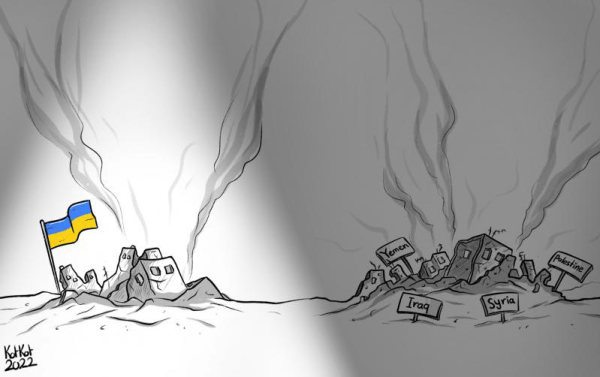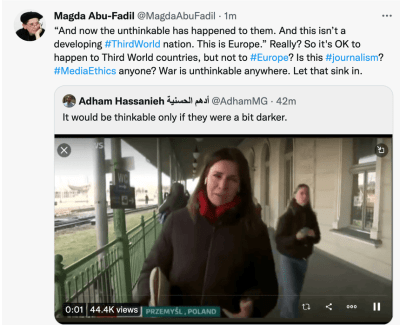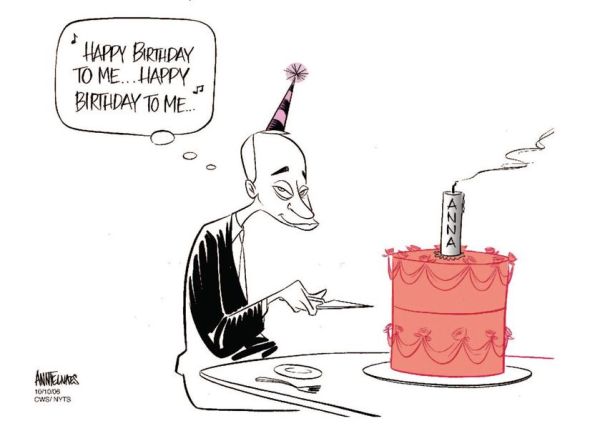
Jordanian cartoonist Morad Kotkot (Cartoon Movement) asks today’s question: Why is the whole world focused on Ukraine, when it doesn’t seem to pay any attention to other wars?
It’s possible to nitpick his choices, given that we started the Iraq war and bailed out on the Syrians and have conflicts of interest that keep us from addressing the plights of the Palestinians and Yemenis, but that would also dig us further into the issue.

Turkish cartoonist Mikail Ciftci (Cartoon Movement) is more direct in his analogy, accusing the media of burying their heads for those other conflicts but focusing on this one.
It’s a fair accusation: The degree to which a war dominates our media is a reflection of the degree to which it dominates our lives. I felt, years ago, that if the government had imposed rationing during the Vietnam War, with scrap iron drives, Victory gardens and suchlike, there would either have been greater support for the war or a stronger demand to get out.
As it is, I think we paid more attention during Vietnam than we did during Iraq and Afghanistan, and, certainly, during our involvement in Syria, while we’ve all but ignored Saudi Arabia’s attacks in Yemen.
Maybe it was because, back then, we had fewer media outlets and more gatekeepers keeping our noses in the war.
Or maybe it was the draft, though there were so many ways to avoid combat that you didn’t need a rich daddy, a compliant doctor and a set of mystical heel spurs to stay safe. You could even serve in the military without serving in the mud, if you made the right moves.
In any case, Kotkot and Ciftci are correct that most wars fly below the radar, and while, as noted, you can explain it, you really can’t excuse it without confronting the actual reason:
It’s not happening to “us.”
Jordanians and Turks aren’t the only people who might object to that definition of “us,” and pushing back against the accusation only reinforces its righteousness.
Granted, there is a fallacy in “Stop caring about what you care about and start caring about what I care about,” but this is less about that and more about asking that reporters, and news consumers, examine their own unconscious prejudices.
It’s not blatant racism. It’s worse: It’s ingrained, not chosen.
Magda Abu-Fadil, who has written, lectured and consulted on how race impacts international reporting, has a devastating collection of examples of how Western journalists have revealed their bias, including these gems:


And this astonishment that hard times could come to people who look like “us” extends to the difference in how Ukrainian refugees are addressed, as seen in this
Juxtaposition of the Day


(Eric Garcia Garcia – El Machette)
Again, there are ways to nitpick the issue in order to avoid the charge, particularly when you have poor, unskilled people walking to your border and can contrast them with the more skilled middleclass people who arrive otherwise.
But not only is it nitpicking, it’s accepting a false premise, because even the people who arrive on foot in our Southwest, or by boat on European shores, have nearly always paid significant amounts to smugglers, while many others have shown up without visas but hardly barefoot.
When I was a reporter in Plattsburgh, NY, we had a large number of Somalis who sought asylum in Canada but had to register there and return to the US to wait for their hearings. Our community accepted them, but they were very visible, not only for skin color in our largely white town but because of their flowing clothes.
Once you surmounted the language barrier, however, you found that they were a great deal like “us,” in large part because you can’t walk from Somalia to the United States. These were modern, middleclass folks who simply didn’t want to die in war. The people who needed to be pitied were the ones who couldn’t get out of Somalia, not the ones who could.
Moreover, I met a chemist there — a landed immigrant in the US — who was from Soweto, South Africa, which I thought was mostly dirt streets and primitive housing, who assured me that he’d lived in a nice house on a paved street, but that foreign news crews rarely shot footage of him mowing his lawn.
Similarly, Saigon was a stream of motorbikes, Kabul was full of coffeeshops and my friends from Ulster felt perfectly safe in Belfast at the height of the Troubles, but were scared to death of visiting LA or Detroit, based on what they saw on TV.
There are plenty of people in the world who are much like “us,” and who even live much like “us,” depending on how you define the term.
How you define the term being a measure of your civilization, not theirs.

Matt Wuerker (Politico) takes up the conversation on this end of the globe, and he poses matters in a challenging way, because the split in our caring doesn’t mean we shouldn’t condemn Russia for invading Ukraine, but it does mean we should not ignore what Saudi Arabia is up to.
It’s nice that Congress now wants to cut off the trickle of Russian oil to the US, but it would also be nice if they replaced Dear Leader’s son-in-law with someone who wasn’t quite so friendly with the murderers of Jamal Khashoggi and bombers of countless Yeminis.
Maybe we could emerge from this European catastrophe with a clearer vision of what war means, wherever it happens.

Pat Bagley asks a question I can answer, with this
Juxtaposition of 2006



And, yes, Anna Politkovskaya was murdered on Putin’s birthday.
I’d say, “I guess you had to be there,” but we were all there and so the question is what on earth he needed to do in order to get our attention.
For instance, the first time he invaded Ukraine, we barely noticed.

Kal Kallaugher regrets the flow of misinformation with which Putin floods his people. I don’t disagree, but I think, in this interconnected world, that people can find out what’s happening, if they truly want to know.
After all, nothing really changes but the uniforms.
Not sure the whole world is focussed on Ukraine but it does seem most of the “Western world” is. Raising the issue that other wars weren’t about “us”, and so don’t get the coverage and attention being given to Ukraine, gets us nowhere. To question this approach/accusation ought not reinforce its righteousness so much as underline it as a personal, editorial, or nationalistic point of view (POV).
From my POV here in NZ, and ignoring the “us” criticisms for a moment, many analyses of the actions of the “West”, and what underlies them, miss important points. One is that Putin was enabled by the USA having Trump as president for four years (the mileage on this may differ for some). In the past the US has, for better or worse, become involved in overseas conflicts but never (?) enabled a despot as with Putin. Funding & support, yes, such sycophancy and willing submission? So, for some, this conflict has to be “owned” by the West because our principal ally set the ground for it to happen.
A second and very important point is that the “West” has many 100s of years of involvement in the matters of Europe, including Eastern Europe. For the common man/soldier it has been a seemingly insatiable graveyard filled with the hope of peace, freedom, and no more wars. Yet, once again, a brutal dictator is on the loose in Europe blasting a country into rubble and killing at will. All wars are tragic but have their differences. In the case of Ukraine, especially for Europeans and their friends, they are both like us and share significant parts of our difficult and long history and culture. That makes this very different for the “West” from wars and conflicts elsewhere in the last few decades.
As for bias in the presentation of news, well, commentators like Jordanian Morad Kotkot and American Eric J Garcia indeed have a valid viewpoint from their POV, but lacking the specific insights and connections a “European” would have for this situation. Same, perhaps especially, for Mikail C?iftc?i who, if not a cynic, may be unaware of the issue of Poland in 1939, or is he tubthumping? So, who gets to create the acceptable definition of “us” and unbiased reporting? Americans? The Prime Minister of NZ? It is, I would contend, too important to leave to journalists (think Tucker Carlson). As a concluding aside, Dorothy L Sayers gave a talk on the freedom of the press (How Free Is the Press”) in 1941. Though light hearted it should be compulsory reading for all journalists, and taken as a prophylactic by everyone else.
Apologies if this seems grumpy but we recently had a short and violent outbreak of the “American Disease” and full equilibrium has yet to return.
Something has been nagging away at me all day about Mikail C?iftc?i’s cartoon
It is his horizon of war and horror – he excludes the massacre of Armenians in his own homeland. An act still in need of world attention and investigation, and perhaps not too dissimilar to what is happening in Ukriane?
The answer to your second point is simple: He listed current wars, and the Armenian genocide was 110 years ago.
Your main point is more complicated but the fallacy that European/Western wars matter more than wars of other people on other continents is the point of the posting. You can’t eliminate the “us” factor and have anything left to debate, and, in the attempt, you run the risk of emphasizing, rather than diminishing it.